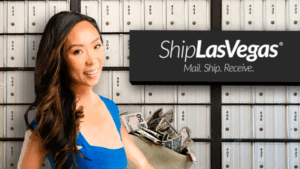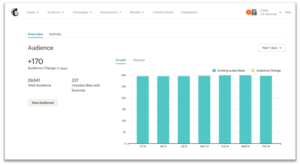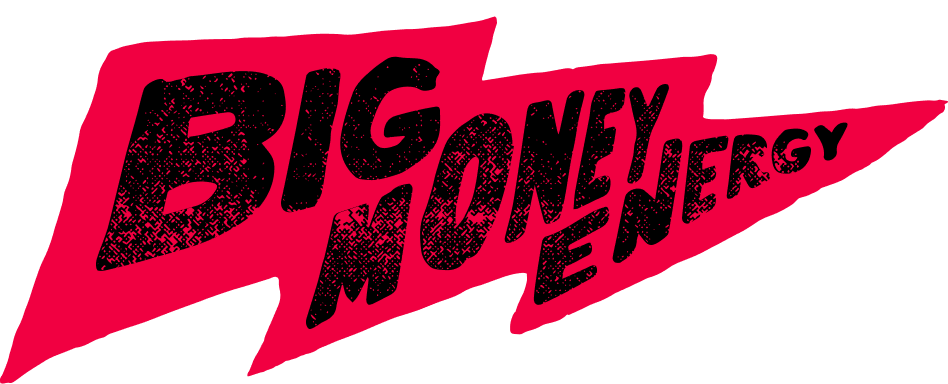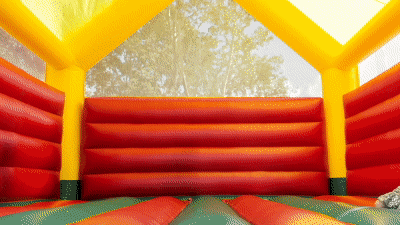
Who didn’t have fun climbing and jumping in a bounce house as a kid?
That fun? Timeless: Adults-only bounce house locations and parties are a thing.
Any backyard barbecue or birthday party gets an instant upgrade with a bounce house. Moon bounces and inflatable water slides are a fun way to keep kids occupied.
And most parents don’t want to buy one outright. That makes a bounce house rental company a profitable business idea.
Here are the steps to follow if you want to start a bounce house business and why buying an existing one is a better idea.
Why Buy a Bounce House Business Instead of Starting One?
Bounce house businesses look like tons of fun, but they still come with challenges for new entrepreneurs.
Here are the big ones:
- Bounce houses are most popular in the summer, so they can end up sitting in your warehouse or garage unused for months at a time.
- Accidents and injuries happen in this business. You need solid safety policies and good insurance to keep everyone protected.
- Kids are hard on everything, and bounce houses are no exception. If you’re lucky, you’ll get 5-7 years of use before you retire an inflatable. Until then, regular maintenance may keep you busy.
- You’ll want more than one inflatable, and they can get expensive. The average daily booking rate for bounce houses is $238, so owning a few is the only way to scale beyond a weekend side hustle.
- You need to budget for more than just the inflatable. You’ll need a way to transport and store your bounce houses and a way to reach potential customers.
But there is a way to make an end run around some of the startup challenges. You can find someone else who owns a bounce house company to sell to you.
An existing business owner understands the unique challenges of this niche and gives you a firm foundation to grow as soon as you take over.
And buying one of these businesses isn’t out of your reach. You can find businesses for sale on online marketplaces like BizBuySell. And you can use BizScout, a tool we built to help entrepreneurs find their next business, to find great off-market deals.
But if you still want to start a bounce house business, follow the steps below to launch your company.
Bounce Into Market Research
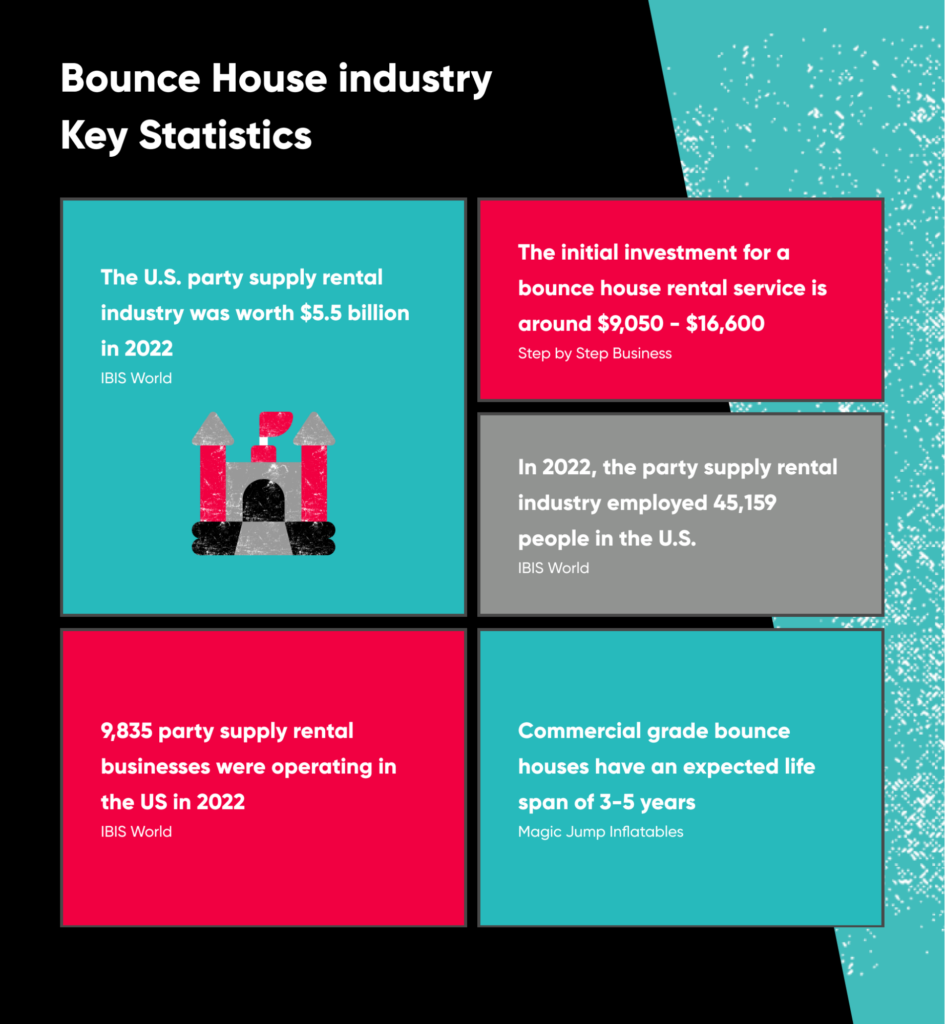
Know your market before you commit to opening a bounce house rental company. Market research tells you about the demand in your area and where you can really make money.
Here are some places you’re most likely to score bookings for a bounce house:
- Children’s parties
- Community events
- Corporate gatherings
For a bounce house company, an ideal base of operations is one with plenty of kids in the region.
Check out your rental competitors in the area to get a gauge on:
- How far out in advance the houses book
- The average cost per rental
- The different styles and types of houses available
Read your competitors’ reviews, too.
Check out what past customers have to say about them. Knowing what people like or dislike about a service is a powerful way to think about how to make your business stand out.
Use what you find to decide if there’s space in the market for your new company or if there’s demand in your area.
Buying a bounce house business from someone else gives you a leg up on the market research.
For one thing, an established business has already found its place in the market. All you need to do is review their bookings and revenue to confirm the business is profitable. From there, you can compare the business to competitors to see how you can make it a better fit for the market.
Create Your Business Plan
To outline all the steps to launch and the funds you need to break in, start by creating a business plan. This roadmap covers things like:
- A summary of your market research
- A full list of equipment and other expenses
- A list of the licenses and insurance your business needs
- Your services and pricing
- Your marketing plan
Your business plan is the guiding document for your company. Even if you have a simple plan, you need to put a lot of thought into it to cover all your bases.
You’ll also need a business plan if you want outside funding from a bank or investors.
You can start off with a complete business plan if you find another person selling a bounce house company. You’ll need to review and update the current business plan, but you won’t have to start from scratch.
Know the Legal and Regulatory Considerations You Must Follow
Only a few states require specific licenses for bounce house companies, but every business owner should get a general business license.
General liability insurance will reduce your risks, too.
But don’t stop there. If you don’t operate the equipment yourself, require each homeowner to sign a waiver. A waiver can provide you some protection when accidents happen.
The insurance you need also varies by the types of events you cater to. Community or corporate events might require bounce house owners to carry an insurance policy with at least $1 million in coverage.
These bigger events may also mandate a certificate of additional insured. You can obtain these from your insurance carrier before the big day.
Liability insurance helps, but the best prevention? Clear rules about what people can and can’t do.
Check out this list of example bounce house rules as a starting point.
@thejumperguy7 How do you clean this?? #boucehouse #business #partyrental #funny #fail #thejumperguy ♬ original sound – Ant 🐜
Putting rules in place and having the right insurance coverage will help keep everyone safe, protect your equipment, and give you and your clients peace of mind should anything happen.
Buying an established bounce house business allows you to bypass a lot of the headaches of registering and setting up insurance. You’ll start off with an operation that’s already registered and has the proper protection in place.
Finance Your Business and Get Your Equipment
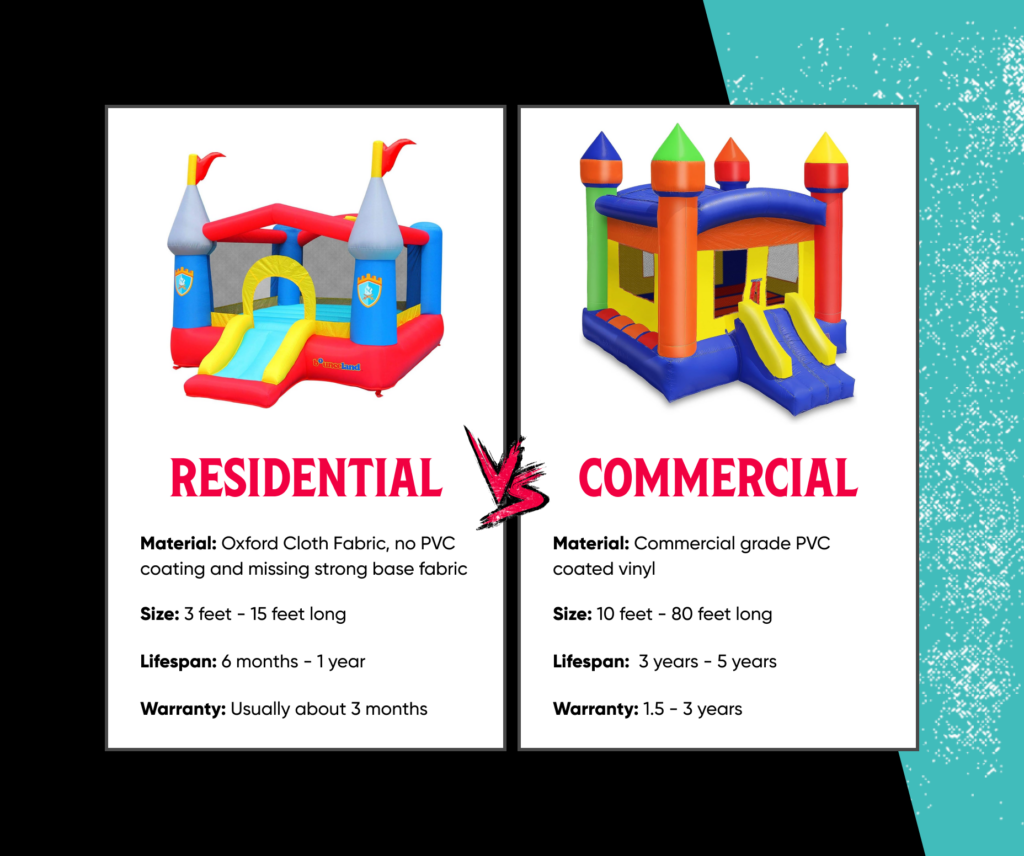
You need initial capital to purchase bounce houses and other needed supplies.
First, you need an actual bounce house. Here you have the choice between:
- Residential bounce houses
- Commercial bounce houses
A decent residential model will run around $700-850. A commercial bounce house is closer to $1500.
Commercial bounce houses might cost more upfront, but they’re built with better materials and a better lifespan with wear and tear.
Commercial bounce houses also come with better manufacturer’s warranties. Read the fine print, but most come with 1-3 years.
Some people choose to start with 1 or 2 bounce houses. But you’ll want more at some point so you can rent multiple items on busy Saturdays.
Beyond the bounce house itself, get these:
- A blower to inflate the houses
- Extension cords
- Cleaning materials like a vacuum and other sanitization tools
- A hand truck to move the bounce house on the property
- A generator if there’s no power source
- Duct tape, sand bags, and stakes
2 other items will impact your startup and ongoing budget:
- You need a place to store the equipment (such as renting a storage facility or a mobile storage unit).
- You need at least one vehicle to bring your rentals to events.
New business owners have a few different options for funding their business, including:
- Your own funds (cash savings or credit)
- Business loans
- Personal loans
- Investors
Loans are a pain to get but can give you all the upfront money needed to acquire materials. You’ll still need to plan for immediate cashflow to keep up with the terms of the loan.
Investors provide you with a cash injection, but you lose a part of the business. In the worst cases, you’ll end up paying a silent partner forever for the small investment at the start.
But buying someone else’s business opens up another option: Seller financing.
In this kind of deal, you make a small down payment to a bounce house owner to buy their business. Then, you pay them the rest of the business’s value over time out of your revenue.
You can get a fully operational business on better terms than a bank loan through seller financing. Plus, you get all of the business’s equipment, customer relationships, and operations setup.
Set Up Your Operations

Running a bounce house business all by yourself is doable, but all of the pressure is on you. You’ll take on all the behind-the-scenes work, like accounting, marketing, and customer service.
Getting some help takes that pressure off you. 2 ways you can get some help are by:
- Using software to operationalize your business.
- Hiring help for transport, setup, and maintenance.
Use tools whenever possible to keep things organized. Venue management software like ClubSpeed or Good Shuffle Pro makes it simple to check your inventory and bookings.
Create processes for rental check-in and check-out, communicating rules to customers, and for general customer service.
Regular cleaning and maintenance will extend your equipment’s life and prevent malfunctions. Follow these steps every time you rent:
- Check the material for any rips or tears before sending it out to an event.
- Fully clear the area where the inflatable will be set up, removing any items on the ground that could cause bounce floor tears.
- Firmly stake the bounce house down before every use.
- Enforce the rules (especially weight limits and no-shoes policies.)
- Use only the recommended power source for the inflatable.
- Dry the product fully before taking it down and storing it.
Buying someone else’s bounce house business makes operationalizing easier. An ideal business to buy already has procedures in place. You may need to grab new software or write out SOPs, but you’ll start with something that’s already working.
Market and Promote Your Business
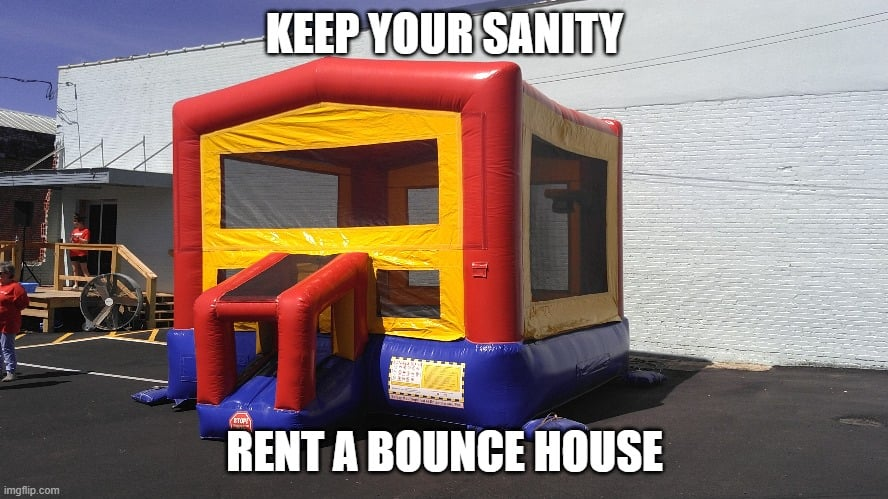
You have to make your name known to get bookings from families and corporate clients. You’ll need both offline advertising and online marketing to build brand awareness.
Leverage flyers and brochures in your community for general marketing, but partner with local businesses, too.
You might even put your logo, brand, and phone number on the side of your bounce houses so other event planners and parents spot your info.
Create a digital presence with:
- A solid, modern website
- Photos of your materials on social media
- Reviews from customers on places like Yelp and Google Business
Reviews are the lifeblood of any small business. People trust the word of other people just like them (customers) more than they do anyone else (business owners).
Try to get reviews from every happy customer. When potential customers see the good things other people have to say, they’re more likely to contact you.
And remember, you’re not marketing to kids but to their parents. Lean into their needs (like peace and quiet or burning out kid energy) in your marketing just as much as you do the fun factor.
Established businesses have a huge advantage over new ones. They already have traction in the market. If you buy a business, you get to tap into that and grow from an established presence.
Expanding and Growing Your Bouncy Castle Empire
It’s time to start focusing on growth as soon as your new bounce house business has its footing.
Bounce house owners can expand in a few different ways. The 2 most popular options are:
- Buying more bounce houses to increase the number of rentals you can offer at a time.
- Expanding into a full party rental service.
Either option works, but the second one comes with a few advantages.
With a party rental business, you’ll have a more diverse range of offerings, so you’ll have a broader customer base. You can also be able to get around the seasonality problem bounce houses face since some of your new equipment will work indoors.
Expansion is something that you should keep in mind when you first start your business. But it can take a while for new business owners to get to this point.
People who choose to buy an established business get to this point much faster. They start on a firm foundation and are able to build from there once they get their bearings.
Blow Up Your Business with a Bounce House
Love the idea of bringing a total blast to someone’s backyard? A bounce house business is an awesome weekend gig, but it could also scale into a full-blown company.
If you learn the market demand, build a business plan, and obtain the equipment, you could start quickly, too.
But if you find someone else’s bounce house company for sale, you can speed through a lot of startup challenges.
